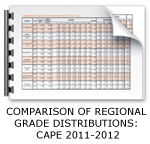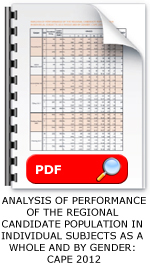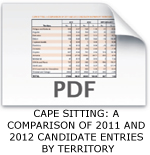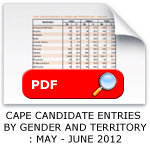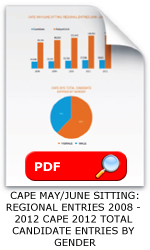![]()
![]()
![]()
Administration of the ExaminationForty-four Units were offered in 24 subjects for CAPE this year. Performance of CandidatesOverall performance at CAPE remained steady at 89 per cent of Unit entries achieving acceptable grades, I – V. Performance in individual Units is reported below. ACCOUNTINGOverall performance in Unit 1 remained stable with ninety-five per cent of candidates achieving Grades I–V in 2012 as in 2011. Performance on Module 3, Financial Reporting and Interpretation, showed an improvement over that of last year; that notwithstanding, many candidates had challenges with interpreting the meaning of numerical accounting information. In Unit 2 overall performance declined slightly with eighty-two per cent of candidates achieving Grades I–V in 2012 as compared with 84 per cent in 2011. Candidates performed better on Module 1, Costing Principles, in 2012 than in 2011. Candidates had challenges in Module 3, Planning and Decision Making. APPLIED MATHEMATICSAn improvement in performance in the Unit 1 examination was seen with 83 per cent of the candidates achieving Grades I–V compared with 81 per cent in 2011. Candidates performed well on Module 1, Describing and Collecting Data, and Module 2, Managing Uncertainty, while Module 3, Analysing and Interpreting Data, proved to be a challenge for some candidates. There was a decline in the performance of candidates who wrote Unit 2 examination. Eighty-one per cent of the candidates achieved Grades I–V compared with 89 per cent in 2011. Overall module performance was lower on the three modules, but more so on Module 3, Particle Mechanics. Performance on the School-Based Assessment component of the examination was satisfactory. Candidates demonstrated adequate expertise in the use of statistical language, jargon and symbols. ART AND DESIGNIn the Unit 1 examination, 100 per cent of the candidates achieved Grades I–V in 2012 compared with 99 per cent in 2011. Ninety-nine per cent of the candidates achieved Grades I–V in Unit 2 compared with 98 per cent in 2011. The Production Pieces in both Units were well executed and there was some commendable two-dimensional and three-dimensional work. However, Unit 1 Module 1 - Cultural Studies - which tested candidates’ knowledge of the linkages between art and design and the cultural aspects of the Caribbean - continued to pose the greatest challenge for the candidates. The projects submitted for the School-Based Assessment component in both Unit 1 and Unit 2 were generally very creative and improvement was evident in the area of craftsmanship. BIOLOGYFor Unit 1, there was an improvement in candidate performance in 2012. Approximately 90 per cent of the candidates achieved acceptable grades, Grades I–V, compared with 81 per cent in 2011. Candidate performance in Unit 2 remained steady with 96 per cent of the candidates achieving Grades I–V in 2012 as occurred in 2011. For both Units, there was significant improvement in candidate performance on Paper 01, the Multiple Choice paper. However, in Unit 1 Paper 02, the Structured Essay paper, there was evidence to suggest that candidates had difficulties with schematic diagrams, and gene mutation as applied to sickle-cell anaemia. In Unit 2, conceptual ecological topics presented great challenges for the candidates. CARIBBEAN STUDIESThere was overall improvement in performance when compared with 2011. Ninety-seven per cent of the candidates who wrote the examination in 2012 achieved Grades I-V compared with 94 per cent who achieved similar grades in 2011. Too many candidates demonstrated weaknesses in their grasp of basic concepts that are integral to the study of Caribbean Studies. Module 2 in particular, which tests candidates’ understanding of Caribbean economic development, continued to pose challenges for candidates. The quality and overall presentation of the research papers for the School-Based Assessment component of the examination was satisfactory. However, several instances of plagiarism were evident in the work submitted for moderation. CHEMISTRYThe performance of candidates in the 2012 Unit 1 examination has improved over the performance in 2011. Twenty-four per cent of the candidates achieved Grade 1 in 2012 compared with 15 per cent in 2011; 90 per cent achieved Grades I–V, compared with 81 per cent in 2011. In the Unit 2 examination, 29 per cent of candidates achieved Grade I consistent with the 30 per cent in 2011; 92 per cent achieved Grades I–V, compared with 91 per cent in 2011. For Unit 1, the candidates seemed to be most comfortable with Module 1, Fundamentals in Chemistry, and least comfortable with Module 2, Kinetics and Equilibria. For Unit 2, the candidates were most comfortable with Module 1, the Chemistry of Carbon Compounds and least comfortable with Module 2, Analytical Methods and Separation Techniques. In general, candidates experienced difficulty in using technical language in their responses to questions, showing a weak grasp of concepts and principles. The majority of candidates continued to perform unsatisfactorily on questions which focus on experimental skills and experiences that the syllabus requires them to garner through laboratory exercises. The planning and design skill continues to present challenges to a significant number of candidates and teachers. COMMUNICATION STUDIESOverall performance in Communication Studies in 2012 was good. Approximately 95 per cent of candidates achieved Grades I–V, compared with 95 in 2011 and 96 per cent in 2010. Improved performance was especially noted at the Grades I and II levels and in Module I, Language and Community and Module III, Speaking and Writing. Performance on Paper 01A improved significantly, while it declined marginally on Paper 02. Weaknesses were observed in organization and expression skills in this paper. There was also a significant decline on Paper 032, the Alternative to the School-Based Assessment. COMPUTER SCIENCEIn Unit 1, the percentage of candidates achieving Grades I–V increased from 87 per cent in 2011 to 94 per cent in 2012. This was due to a significant improvement in performance on all papers, and in particular Paper 02, the Essay paper. There was marked improvement in all three modules compared with 2012. In Unit 2, eighty-nine per cent of the candidates achieved Grades I–V, compared with 87 per cent in 2011. Candidates continue to experience difficulty with algorithmic development and computer programming. Performance on the School Based Assessment was satisfactory. ECONOMICSThere was a decline in the performance of candidates in the 2012 Unit 1 examination. Eighty-two per cent of the candidates achieved Grades I–V compared with 91 per cent in 2011 and 88 per cent in 2010. There was a decline in the performance of candidates on Paper 02, the Essay paper. There was an improvement in performance on Paper 032, the Alternative to the School-Based Assessment. However, performance on Paper 01, the Multiple Choice paper, and Paper 031, the School-Based Assessment was consistent with 2011. Decline in performance was also evident in the three Modules. In Unit 2 there was a decline in the performance of candidates in 2012. Seventy-nine per cent of the candidates achieved Grades I–V compared with 87 per cent in 2011 and 86 per cent in 2010. There was a decline in the performance of candidates on Paper 01, the Multiple Choice paper and Paper 02, the Essay paper. However, performance on paper 031, the School-Based Assessment and Paper 032, the Alternative to the School-Based Assessment was consistent with 2011. Decline in performance was also evident in the three Modules. ELECTRICAL AND ELECTRONIC TECHNOLOGYPerformance of candidates who wrote Unit 1 examination was comparable with performance in 2011. Sixty-six per cent of the candidates achieved Grades I–V in both years. With respect to Unit 2, approximately 74 per cent of candidates who wrote the examination achieved Grades I–V, a decline in performance when compared with 80 per cent in 2011. However, despite the overall decline, there was an increase in the percentage of candidates at the top three grades. ENVIRONMENTAL SCIENCEIn Unit 1, overall performance was comparable with that of 2011 with 94 per cent of candidates achieving Grades I–V, similar to what obtained 2011. There was improvement in the overall quality of the School-Based Assessment. In terms of module performance, candidates performed best on Module 3, Sustainable Use of Natural Resources, followed by Module 1, Fundamental Ecological Principles, and then Module 2, Human Population and the Environment. Ninety-five per cent of the candidates achieved Grades I–V in Unit 2 compared with 92 per cent in 2011. There was improvement in the overall quality of the School-Based Assessment. Candidates performed best on Module 1, Agriculture and the Environment, followed by Module 2, Energy and the Environment, and then Module 3, Pollution and the Environment. FOOD AND NUTRITIONIn Unit 1, overall performance was comparable with that of 2011 with 99 per cent of candidates achieving Grades I–V. Candidates performed better on Module 1, Principles of Nutrition and Health, and Module 2, Food Selection and Meal Planning, than on Module 3, Food Preparation and Service: Principles and Methods. In Unit 2, overall performance was comparable with that of 2011 with 98 per cent of candidates achieving Grades I–V. Candidates performed better on Module 1, Caribbean Food Ways and Food Systems, and Module 3, Food Preparation and Service: Large Quantity and Commercial, than on Module 2, Food Science and Technology. FRENCHNinety-six per cent of the candidates achieved Grades I–V in Unit 1 in the 2012, a similar percentage as was achieved in 2011. However, there was significant improvement at the highest grade. There was improved performance on Paper 01, which assessed the aural skills, and on Paper 04, the oral paper which comprised the School-Based Assessment. There was a slight decline in candidates’ performance on Paper 02, which assessed the reading and writing skills while on Paper 03, which assessed the literary skills performance was comparable with that of 2011. Mean performance between Module 1, L’individu, la famille et la vie journalière, and Module 2, La société et les affaires sociales, was comparable but was slightly higher on Module 3, L’environnement. Grammar, general vocabulary and essay writing skills continued to pose the greatest challenges to candidates. In Unit 2, there was 100 per cent of candidates achieving acceptable Grades I–V, compared with 96 per cent in 2011. There was also a significant increase in the percentage of candidates achieving the two highest grades. With respect to the Modules, mean performance improved across Module 1, L’actualité, Module 2, La science et la technologie, and Module 3, L’industrie, le commerce et l’économie. GEOGRAPHYThe percentage of candidates who achieved Grades I–V in Unit 1 decreased to 91 in 2012 from 93 in 2011. In Unit 2 the percentage of candidates achieving Grades I–V decreased to 87 per cent in 2012 from 92 in 2011. Much improvement was noted in the performance on questions focusing on natural events and hazards. Generally, the candidates earned the lowest mean scores on tasks relating to hydrological, fluvial, coastal, and limestone environments. The majority of candidates seemed unprepared for questions relating to the new topics of the revised syllabus, particularly on Development and Disparities in Development. It is evident that much more attention to and greater preparation of the content relating to the newer topics are required. Additionally, candidates continue to struggle with some basic concepts, geographical terms, and the language of geography. The improvement noted in the quality of the School-Based Assessments in 2011 was not sustained in 2012, particularly in Unit 2. Greater attention must be paid to the analysis of the data collected. GEOMETRICAL AND MECHANICAL ENGINEERING DRAWINGThe percentage of candidates who achieved Grades I–V in Unit 1 was 61 per cent compared with 69 per cent in 2011. Indeed, examination of the results shows a steady decline in Grades I-III, I-V and also in the number of candidates taking the examination. One candidate achieved Grade 1 this year. In Unit 2, the percentage of candidates who achieved Grades I–V fell to 75 per cent when compared with 89 per cent in 2011. No candidate achieved Grade 1 this year. In both Units, many candidates displayed limited comprehension of some questions. It is unclear if this is due to the lack of experience in engineering or a lack of mastery of the English language. Candidates also showed limited attention to detail and often provided incomplete responses to questions. Generally, line-work, labelling, lettering and all drawing enhancements were quite deficient. Candidates also showed limited spatial abilities, especially in Unit 1 Paper 02, and were unable to complete some assignments. Candidates generally showed improvement in the design and materials components of the examinations, but the lack of text books is still obvious. HISTORYThere was a decline in candidate performance in both Units 1and 2 when compared with 2011. Sixty-eight per cent of the candidates achieved Grades I-V in Unit 1 in 2012 compared with 80 per cent in 2011. Although candidate performance was at a higher standard than in Unit 1, there was also a decline in performance in Unit 2 in 2012 when compared with 2011. Eighty-two per cent of the candidates achieved Grades I-V in 2012 in Unit 2, compared with 89 per cent in 2011. There was a decline in performance on the School-Based Assessment component of the examination. Candidates continued to demonstrate weaknesses in their ability to write well-developed and analytical essays. There was also evidence that candidates did not adequately prepare several themes in the syllabus. INFORMATION TECHNOLOGYNinety-one per cent of the candidates who wrote the Unit 1 examination achieved Grades I–V compared with 89 per cent in 2011. There was notable improvement in Module 1, Fundamentals of Information Technology. While there was a marginal decline in performance on Module 2, Information Technology Systems, the performance on Module 3, Information and Problem-Solving was comparable to that of 2011. Candidates’ performance in Unit 2 was comparable with that of 2011. Ninety-five per cent of the candidates achieved Grades I–V in Unit 1 compared with 96 per cent in 2011. With respect to the modules, the performance was consistent with that of 2011 across all three of the modules: Module 1, Information Management, Module 2, Use of Information Technology Tools, and Module 3, Social, Organization & Personal Issues. LAWEighty-one per cent of the candidates who wrote the Unit 1 examination achieved Grades I–V, down from eighty-three per cent in 2011. The decrease was most noticeable at Grade II where the percentage declined from nineteen per cent in 2011 to seventeen per cent for this year. While the performance on Module I, Caribbean Legal Systems, and Module II, Principles of Public Law, was fairly consistent with that of 2011, there was an improvement in the performance on Module III, Criminal Law. In Unit II, there was an increase in the percentage of candidates achieving Grades I–V. Eighty-two per cent achieved Grades I–V compared with seventy-eight per cent in 2011. While there was a slight increase in the percentage at Grade I, the movement was most noticeable at Grade IV. Candidate performance improved on Module I, Tort, and Module II, Law of Contract, but declined on Module III, Real Property. Overall, there was a noticeable improvement in the quality of candidates’ writing and application of legal principles. This was evident in the increase of candidates at the higher grade levels. LITERATURES IN ENGLISHThis was the first examination using the revised syllabus for Literatures in English. Overall performance at Grades I–V, the acceptable levels of performance, was consistent with that of 2011. Approximately 93 per cent of the candidates achieved acceptable Grades in 2012 compared with 94 per cent in 2011. It must be noted that while overall performance was consistent, the percentage of candidates accessing the top three grades declined. This performance was particularly affected by the performance of the candidates on Paper 01. Eighty-seven per cent of the candidates who wrote the Unit 2 examination achieved Grades I–V, down from 94 per cent in 2011. Similar to the performance in the Unit 1, the number of candidates at the top three grades also declined. The performance at Grades I–III was a reflection of the performance of each of the Modules —Drama, Poetry and Prose Fiction — which experienced a decline in performance at the upper grade levels. The Examining Committee recommends greater analysis of the new textbooks in the syllabus. MANAGEMENT OF BUSINESSThe performance of candidates in 2012 in Unit 1 was consistent with obtained in 2011. Eighty-seven per cent of candidates achieved Grades I–V compared with 88 per cent in 2011. There was an improvement in the performance of candidates on Paper 01, the Multiple Choice paper and Paper 02, the Essay paper. However, there was a decline in the performance on Paper 032, the alternative to the School-Based Assessment. The performance on Paper 031, the School-Based Assessment was consistent with previous years. Overall improved performance was also noted in the three modules, but particularly in Module 3, Business Finance and Accounting. PHYSICSOverall performance was consistent across both Units with that of 2011. Ninety-five per cent of the candidates who wrote Unit 1 in 2012 earned Grades I–V compared with 93 per cent in 2011. While candidates’ performance improved on Paper 01 the Multiple Choice paper, there was a decline on Paper 02, the Extended Response paper, when compared with 2011. With respect to the modules, candidates’ performance declined marginally on Module 1, Mechanics, but improved on Module 2, Oscillations and Waves, and Module 3, Thermal and Mechanical Properties of matter. Approximately 94 per cent of candidates achieved Grades I–V as compared with 92 per cent in 2011. There was an improvement in the performance of candidates on Paper 01, the Multiple Choice paper, and Paper 032, the alternative to the School-Based Assessment. However, on Paper 02, the Extended Response paper, candidates continue to perform unsatisfactorily in practical aspects of this Unit, namely Module 2, AC Theory and Electronics. Candidates need adequate preparation in connecting circuits since this lack of experience is restricting their ability to fully understand the electronics concepts of the syllabus. PURE MATHEMATICSIn Unit 1, there was an overall improvement in the performance of candidates when compared with 2011. Approximately 71 per cent of the candidates achieved Grades I–V compared with 66 per cent in 2011 and 62 per cent in 2010. There was an improved performance on Module 1, Basic Algebra and Functions, and Module 2 Calculus I. The performance on Module 3, Trigonometry and Plane Geometry, was comparable with 2011. Eighty-three per cent of the candidates achieved Grades I–V in Unit 2 of the 2012 examination compared with 82 per cent in 2011 and 74 per cent in 2010. The performance on Module 1, Calculus 2, and Module 3, Sequences, Series and Approximations was comparable with 2011. However, in 2012, candidates’ performance on Module 2, Counting, Matrices and Complex Numbers improved compared with that of 2011 and 2010. SOCIOLOGYOverall performance in both Units declined in 2012 when compared with 2011. Eighty-three per cent of candidates achieved Grades I–V in Unit 1 compared with 89 per cent in 2011. However, there was a general improvement in the quality of performance at Grade I. Ninety-two per cent of the candidates achieved Grades I–V in Unit 2 in 2012 compared with 96 per cent who achieved those grades in 2011. Candidates continued to demonstrate weaknesses in the analysis and evaluation of the main sociological theories and their application to the Caribbean context. Performance on the School-Based Assessment component of the examination was generally satisfactory. However, there continued to be evidence of weak research skills as well as several instances of plagiarism. SPANISHEighty-seven per cent of the candidates achieved Grades I–V in Unit 1 in the 2012 examination compared with 93 per cent in 2011. There was noticeable decline in candidates’ performance on both the internal and external assessment papers — Paper 01, which assessed the aural skills, Paper 02, which assessed the reading and writing skills, Paper 03, which assessed the literary skills and on Paper 04, the oral paper. Performance across the three Modules declined from what obtained in 2011. In Unit 2, ninety-six per cent of candidates achieved Grades I–V, the same as in 2011. However, there was improved performance at the highest grade. There was improved performance on Paper 01, which assessed the aural skills, Paper 02, which assessed the reading and writing skills, and on Paper 03, which assessed the literary skills. Paper 04, the oral paper showed comparability in performance over the two years. In terms of performance on the Modules candidates showed improvement at the higher grades on all three Modules. Candidates’ main areas of weakness were mainly in the literary analytical skills in both Units. |


